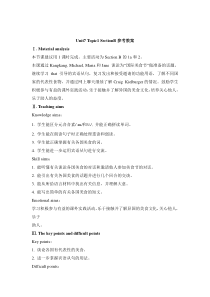 DOC
DOC
【文档说明】Unit 7 Topic 1《We’re preparing for a food festival》(SectionB》word教案-八年级下册英语【仁爱版】.doc,共(8)页,78.000 KB,由小喜鸽上传
转载请保留链接:https://www.ichengzhen.cn/view-104419.html
以下为本文档部分文字说明:
Unit7Topic1SectionB参考教案Ⅰ.Materialanalysis本节课建议用1课时完成。主要活动为SectionB的1a和2。本课通过Kangkang,Michael,Maria和Jane谈论为
“国际美食节”做准备的话题,继续学习that引导的宾语从句,复习发出和接受邀请的功能用语,了解不同国家的代表性食物,并通过网上聊天继续了解CraigKielburger的情况。鼓励学生积极参与有益的课外实践活动,乐于接触并了解异国的美食文化,培养关心他人,乐于助人的态度。Ⅱ.Teachingai
msKnowledgeaims:1.学生能区分元音音素/au/和/Λ/,并能正确拼读单词。2.学生能在朗读句子时正确处理重读和弱读。3.学生能正确掌握有关各国美食的词。4.学生能进一步运用宾语从句进行交流。Skillaims:1.能听懂有关谈论各国美食的对话和邀请他人参加美食节的
对话。2.能引出有关各国美食的话题并进行几个回合的交谈。3.能从所给语言材料中找出有关信息,并理解大意。4.能写出简单的有关各国美食的短文。Emotionalaims:学习积极参与有益的课外实践活动,乐于接触并了解异国的美食文化,关心他人,乐于助人。Ⅲ.Theke
ypointsanddifficultpointsKeypoints:1.谈论各国有代表性的美食。2.进一步掌握宾语从句的用法。Difficultpoints:运用有代表性的美食词汇,写出关于小组成员对各国美食喜好的短文。Ⅳ.Learningstrate
gies1.学生能在朗读句子时注意结构词通常不需要重读。2.在学习有关国家名字和各国人的相关词汇时,注意发现语言的规律并能运用规律举一反三。Ⅴ.TeachingaidsComputermultimediaprojector,thepicturesofsometypicalf
oodsofdifferentcountries,thepicturesoftheflagofdifferentcountries,thepicturesofCraigKielburger.Ⅵ.Teachingproc
eduresStepInteractionpatternStudentactivityTeacheractivityIntroduction(8minutes)1.Thewholeclasswork.
2.Thewholeclasswork.3.Groupwork.4.Thewholeclasswork.5.Thewholeclasswork.1.Focustheirattentionontheteacher.2.Studentsreadthepassage
theywrittenafterclassandevaluatethepassagefromothergroups.3.Studentsplaythegame:Brainstorming.4.Studentsreporttheinform
ationaboutthenamesoftypicalfoodsindifferentcountriestheycollected.5.Studentslearnandgraspthenewwordswiththehelp
oftheteacher.1.Greetstudentsreadyforlearning.2.Teacherasksthestudentstoreportthehomework.Letthestudentsreadthepassagetheywrittenafterclass.Then
letthestudentsfromothergroupsevaluatethepassage.3.Teacherasksthestudentstoreviewthenamesoftypicalfood
sofChina.Playthegame:Brainstorming.Thenaskthemtoreviewthenamesofcountriesandtheirpeople.4.Teacherasksthestudentstoreporttheirlasthome
work.Tellthenamesoftypicalfoodsindifferentcountriestheysearchedafterclass.5.Teacherevaluatesthestudents’work
.Thenteachthenewwords,andshowthepicturesoftypicalfoodsindifferentcountries.Knowaboutcurry,friedrice,andsushi.Showthepicturesof
theflagsofGreece,India,Italy,SouthAfricaandRussia.LetthestudentsgraspthenewwordsGreek,Indian,Italian,African
andRussian.Teachthenewwordwesternbasedonthewordwest.Presentation(10minutes)1.Thewholeclasswork.2.Pairwork.3.Individualwork.4.Thewholeclasswork.5.P
airwork.6.Individualwork.7.Individualwork.8.Thewholeclasswork.1.Studentsspeakoutthenamesoftypicalfoodsshown
onthescreen.2.Studentsreadthenamesofcountriesandtheirspecialfoods.3.Studentslistenandmatchthefoodwiththecountriesthesefood
scomefrom.4.Studentschecktheanswers.5.Studentsmakesimilarconversationsaftertheexample.6.Studentswatchtheflasho
f1a,andthenunderlinethenewwords.7.Studentsreadtheconversationsilentlyandcompletethepassageof1b.8.Studentschecktheanswers.
1.Teachershowsthepicturesoftypicalfoodsindifferentcountriesonthescreen.Askthestudentstospeakouttheirnames.2.Teachershowsthenamesofcoun
triesandtheirspecialfoodsonthescreen.Askthestudentstoreadtheminpairs.3.Teacherplaystherecordingof1aanda
sksthestudentstolistenandmatchthefoodwiththecountriesthesefoodscomefrom.4.Teacheraskstwostudentstotelltheanswers.5.Teacherletsstudentsmakesimilarco
nversationsaftertheexample.6.Teacherasksthestudentstowatchtheflashof1a,andthenunderlinethenewwords.7.Teacherletsthestudentsreadthecon
versationsilentlyandcompletethepassageof1b.8.Teacheraskstwostudentstotelltheiranswers.Consolidation(10minut
es)1.Thewholeclasswork.2.Thewholeclasswork.3.Groupwork.4.Thewholeclasswork.5.Individualwork.6.Thewholeclasswork.7.Thewholec
lasswork.1.Studentsreadtheconversationaftertherecordingsentencebysentence.2.Studentstrytofollowthespeed,payingattentiontothepron
unciationandintonation.3.Studentsdiscussingroupstofindoutthedifficultpointsandsumupthemainpoints.4.Studentsunderlineintheirbooksa
ndmakesomenotes.Learnandgraspthenewwordsandphrases.5.Studentsread1a,andthenfindoutthesentencescontainingobjectclauses.6.Volunteerstellthesent
ences.7.Studentsactouttheconversationof1a1.Teacherplaystherecordingsentencebysentence.2.Teacherplaystherecor
dingwithoutstopping.3.Teacherasksthestudentstolearningroupstofindoutthedifficultpointsintheconversation.Atlastletthemsumup
themainpointsoftheconversation.4.Teachermakesasummarytoexplainthekeypointsanddifficultpointstothestudents.(1)have
asweettooth(2)west→western(3)America→AmericanGreece→GreekIndia→IndianChina→ChineseJapan→JapaneseItaly→ItalianS
outhAfrica→SouthAfricanRussia→Russian5.Teacherletsthestudentsread1a,andthenfindoutthesentencescontainingobjectclauses
.6.Teacheraskstwostudentstotellthesentences.7.Teacheraskthestudentstoactouttheconversationof1a.Practice(10minutes)1.Pairwork.2.Pairwork.
3.Thewholeclasswork.4.Individualwork.5.Individualwork.6.Thewholeclasswork.7.Individualwork.8.Individualwork.9.Pairwork.1.Studentsmakesimil
arconversationsaftertheexampleof1ctopracticetheusageofobjectclauses.2.Studentsaskandanswerinpairs.3.Studentslear
ntheusageofobjectclausesfurther.4.Studentsreadtherecorderof2andunderstandthegeneralmeaning.5.Studentslistenandfillintheblanks.6.Stude
ntschecktheanswers.7.Studentslistenagainandreadaftertherecording,payingattentiontothepronunciationandintona
tion.8.Studentsfindoutthesentenceswhichexpresstheinvitation.9.Studentsreadtheconversationwiththeirpartners.1.Teacherasksthestudentstomakesimilarconv
ersationsaftertheexampleof1ctopracticetheusageofobjectclauses.2.Teacherasksthestudentstoaskandanswerinpairs.3.Teach
erevaluatestheconversationsandstressestheusageofobjectclauses.4.TeachershowsthepictureofCraigKielburger.Tellthestudentsheischattingonl
inewithKangkang.Letthestudentsreadtherecorderof2andunderstandthegeneralmeaning.Teachthenewwordaddressbyshowingt
hee-mailaddressofhimselforherself.5.Teacherplaystherecordingof2andletsthestudentslistenandfillintheblanks.6.Teacherletstwostudentstelltheirans
wers.7.Teacherasksthestudentstolistenagainandreadaftertherecording,payingattentiontothepronunciationandintonation.8.Teacherletsthestudent
sfindoutthesentenceswhichexpresstheinvitation.9.Teacherletsthestudentsreadtheconversationwiththeirpartners.Producti
on(7minutes)1.Thewholeclasswork.2.Thewholeclasswork.3.Thewholeclasswork.4.Thewholeclasswork.5.Thewhol
eclasswork.6.Thewholeclasswork.7.Thewholeclasswork.8.Thewholeclasswork.9.IndividualWork.1.Studentstr
yreadingthephonetics/au/and/ʌ/andthewordsonthescreen.2.Studentslistentotherecordingof3a.3.Studentslistenandtrytoimitate.4.Stu
dentstrytoreadthewordscorrectly.5.Studentsreadthesentencesof3bbythemselves,payingattentiontothestressandweakform.
6.Studentslistenandchecktheirreading.7.Studentslistenandtrytoimitate.8.StudentssummarizeSectionBwiththeteacher.9.Studentsfinis
hthehomeworkafterclass.1.Teachershowsthephonetics/au/and/ʌ/andthewordsonthescreen.Letthestudentstryreadingthem.2.Teacherp
laystherecordingof3a.Letstudentsjustlisten.3.Teacherplaystherecordingof3aagainandletsthestudentslistenandtrytoimitate.4.Teachershow
smorewordsonthescreen.Askthestudentstoreadthemcorrectly.5.Teacherasksthestudentstoreadthesentencesof3bbythemselves,payin
gattentiontothestressandweakform.6.Teacherplaystherecordingof3b.Letstudentslistenandchecktheirreading.7.Teacherplaysthereco
rdingof3bagainandletsthestudentslistenandtrytoimitate.8.Teachershowsthesummaryofthissectiontothestude
nts.9.Teacherassignshomework:(1)Reviewthesummaryafterclass.(2)Writedownapassageaboutthetypicalfoodswh
ichtheirgroupmatesliketoeat.(3)Searchmoretypicalfoodsindifferentcountries.TeachingReflectionThestudentsareinterestedinthetypicalfoodsind
ifferentcountries.Interestisthebestteacher.Theytakeanactivepartintheactivitiesofthissection.Theyrememberthenewwordsquicklybycomparingwiththewor
dstheylearnedbefore.Ⅶ.BlackboarddesignUnit7FoodFestivalTopic1We’repreparingforafoodfestival.SectionB1.haveasweettooth2.west→western3.Ameri
ca→AmericanGreece→GreekIndia→IndianChina→ChineseJapan→JapaneseItaly→ItalianSouthAfrica→SouthAfricanRussia→Russian
 辽公网安备 21102102000191号
辽公网安备 21102102000191号
 营业执照
营业执照